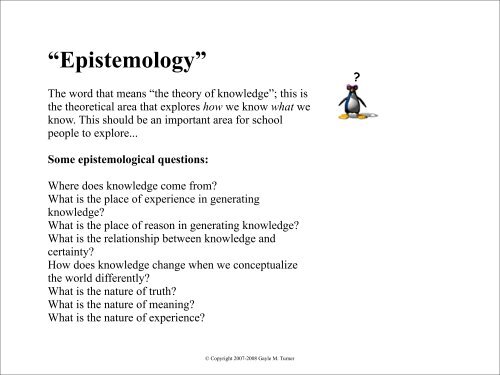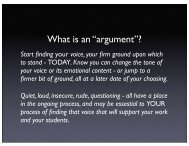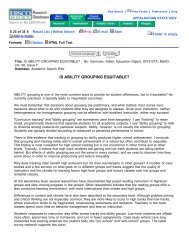âEpistemologyâ - Social and Philosophical Foundations of Education
âEpistemologyâ - Social and Philosophical Foundations of Education
âEpistemologyâ - Social and Philosophical Foundations of Education
Create successful ePaper yourself
Turn your PDF publications into a flip-book with our unique Google optimized e-Paper software.
“Epistemology”<br />
The word that means “the theory <strong>of</strong> knowledge”; this is<br />
the theoretical area that explores how we know what we<br />
know. This should be an important area for school<br />
people to explore...<br />
?<br />
Some epistemological questions:<br />
Where does knowledge come from?<br />
What is the place <strong>of</strong> experience in generating<br />
knowledge?<br />
What is the place <strong>of</strong> reason in generating knowledge?<br />
What is the relationship between knowledge <strong>and</strong><br />
certainty?<br />
How does knowledge change when we conceptualize<br />
the world differently?<br />
What is the nature <strong>of</strong> truth?<br />
What is the nature <strong>of</strong> meaning?<br />
What is the nature <strong>of</strong> experience?<br />
© Copyright 2007-2008 Gayle M. Turner
“Metaphysics”<br />
Originally, this was the title for all the books that came<br />
after the Physics in the philosopher Aristotle’s writing<br />
(384BC-322BC.)<br />
Today: Metaphysics is any enquiry that raises questions<br />
about reality that lie beyond or behind those capable <strong>of</strong><br />
being tackled by the methods <strong>of</strong> science.<br />
An old argument: Are there any such questions? (This<br />
questions refers to the perspective <strong>of</strong> the philosopher<br />
David Hume 1711-76, who believed there were not any<br />
such questions.)<br />
Does metaphysics provide the answer to all questions<br />
not answerable by the basic sciences? Or does it<br />
attempt to answer the questions left over by them?<br />
© Copyright 2007-2008 Gayle M. Turner
Thomas Kuhn<br />
Author <strong>of</strong> The Structure <strong>of</strong> Scientific Revolutions<br />
(1922-1996) Paradigm shifts.<br />
The story we tell about things or ourselves changes.<br />
The heliocentric v. geocentric universe.<br />
Cover <strong>of</strong> a biography <strong>of</strong> Thomas Kuhn.<br />
© Copyright 2007-2008 Gayle M. Turner
Richard Rorty (1931- )<br />
From Wikipedia:<br />
Reception <strong>and</strong> criticism<br />
“Because <strong>of</strong> the clarity <strong>and</strong> humor <strong>of</strong> his writing style, <strong>and</strong><br />
his ability to undermine cherished assumptions, Rorty is<br />
one <strong>of</strong> the most widely-read contemporary philosophers.<br />
His political <strong>and</strong> moral philosophies have been under<br />
almost constant attack both from some on the Right, who<br />
call them relativist <strong>and</strong> irresponsible, <strong>and</strong> some on the<br />
Left, who believe them to be insufficient frameworks for<br />
social justice. The most common criticism is that Rorty's<br />
work is self-refuting (see Nagel <strong>and</strong> Nozick for instance),<br />
although such criticisms <strong>of</strong>ten play directly into Rorty's<br />
theories about arguing within versus arguing outside <strong>of</strong> a<br />
given 'language-game'.”<br />
© Copyright 2007-2008 Gayle M. Turner
Find the following definitions in<br />
“Solidarity as Objectivity:”<br />
1. What is a “realist”?<br />
2. What is a “pragmatist”?<br />
3. What is a “relativist”?<br />
4. What is a “God’s eye view”?<br />
?<br />
© Copyright 2007-2008 Gayle M. Turner
Key questions to consider from the<br />
readings:<br />
?<br />
1. What is truth as solidarity?<br />
2. Why does the scientist replace the priest?<br />
3. How do we cease to see the scientist as a priest, but instead<br />
as a moral exemplar?<br />
• The answer to this question has bearing on how we<br />
think <strong>of</strong> the creators <strong>of</strong> tests <strong>and</strong> analyzers <strong>of</strong> school<br />
performance.<br />
4. Why does he argue that the only virtue <strong>of</strong> scientists is<br />
moral virtue, not the virtue <strong>of</strong> rationality?<br />
© Copyright 2007-2008 Gayle M. Turner
Common notions <strong>of</strong> the nature <strong>of</strong><br />
truth<br />
Two descriptions using metaphors:<br />
The building<br />
The boat<br />
© Copyright 2007-2008 Gayle M. Turner
The Building Metaphor<br />
Descartes (1596-1650) (1984, vol. 2, p. 366) uses this<br />
metaphor:<br />
“Throughout my writings I have made it clear that my<br />
method imitates that <strong>of</strong> the architect. When an<br />
architect wants to build a house which is stable on<br />
ground where there is a s<strong>and</strong>y topsoil over underlying<br />
rock, or clay, or some other firm base, he begins by<br />
digging out a set <strong>of</strong> trenches from which he removes<br />
the s<strong>and</strong>, <strong>and</strong> anything resting on or mixed in with the<br />
s<strong>and</strong>, so that he can lay his foundations on firm soil. In<br />
the same way, I began by taking everything that was<br />
doubtful <strong>and</strong> throwing it out, like s<strong>and</strong>; <strong>and</strong> then, when I<br />
noticed that it is impossible to doubt that a doubting or<br />
thinking substance exists, I took this as the bedrock on<br />
which I could lay the foundations <strong>of</strong> my philosophy.”<br />
Descartes, R. 1984. <strong>Philosophical</strong> Writings <strong>of</strong> Descartes (J. Cottingham & R. Stooth<strong>of</strong> & D.<br />
Murdoch, Trans.). Cambridge: Cambridge University Press.<br />
© Copyright 2007-2008 Gayle M. Turner
The Boat Metaphor<br />
In the 1930s, Otto Neurath (1882-1945) (1959, p. 201) wrote:<br />
“No tabula rasa exists. We are like sailors who must rebuild their ship<br />
on the open sea, never able to dismantle it in dry-dock <strong>and</strong> to<br />
reconstruct it there out <strong>of</strong> the best materials. Only the metaphysical<br />
elements can be allowed to vanish without trace. Vague linguist<br />
conglomerations always remain in one way or another as components<br />
<strong>of</strong> the ship.”<br />
Quine (1908-2000) (1960, pp. 3-4) popularized the metaphor:<br />
"Neurath has likened science to a boat which, if we are to rebuild it,<br />
we must rebuild plank by plank while staying afloat in it. The<br />
philosopher <strong>and</strong> the scientist are in the same boat. Our boat stays<br />
afloat because at each alteration we keep the bulk <strong>of</strong> it intact as a<br />
going concern."<br />
Neurath, O. 1959. "Protocol Sentences." In Logical Positivism, edited by A. J. Ayer, pp. 199-208.<br />
Glencoe, IL: The Free Press.<br />
Quine, W. V. O. 1960. Word <strong>and</strong> Object. Cambridge, MA: MIT Press.<br />
© Copyright 2007-2008 Gayle M. Turner
© Copyright 2007-2008 Gayle M. Turner
What, according to Rorty, is the difference<br />
between:<br />
• Solidarity <strong>and</strong> Objectivity?<br />
?<br />
• (And, why does it matter to us?)<br />
© Copyright 2007-2008 Gayle M. Turner
Solidarity<br />
• Stories about people<br />
Objectivity<br />
• Stories about non-human<br />
reality<br />
© Copyright 2007-2008 Gayle M. Turner
Solidarity<br />
Objectivity<br />
• Pragmatists<br />
• The struggle to shift from<br />
objectivity to solidarity<br />
(democracy)<br />
• Realists<br />
• The search for absolute,<br />
non-human truth<br />
© Copyright 2007-2008 Gayle M. Turner
Solidarity<br />
Objectivity<br />
• “Human nature” is, in part,<br />
socially constructed over time<br />
• Solidarity is sought regarding<br />
ahistorical human nature<br />
© Copyright 2007-2008 Gayle M. Turner
Solidarity<br />
Objectivity<br />
• “t”ruth as<br />
what it is good for us to believe<br />
(somebody may come up with a<br />
better idea)<br />
• “T”ruth as<br />
correspondence to reality<br />
© Copyright 2007-2008 Gayle M. Turner
Solidarity<br />
Objectivity<br />
• Easy agreement: We call this<br />
“knowledge”<br />
• Think <strong>of</strong> a unanimous jury<br />
decision<br />
• Forced agreement is allowed<br />
• Think “inquisition”, or Galileo<br />
under house arrest<br />
© Copyright 2007-2008 Gayle M. Turner
Solidarity<br />
Objectivity<br />
• When it is difficult to agree:<br />
We call this opinion<br />
• Think, perhaps, <strong>of</strong> a hung jury<br />
• “It’s just an opinion. Who<br />
cares?”<br />
• Think “Nathan Price in the<br />
Congo.”<br />
© Copyright 2007-2008 Gayle M. Turner
?<br />
Solidarity<br />
Stories about people<br />
Pragmatist: The struggle to<br />
shift from objectivity to<br />
solidarity (democracy)<br />
“Human nature” is, in part,<br />
socially constructed over time<br />
“t”ruth: what it is good for us<br />
to believe (somebody may<br />
come up with a better idea)<br />
Easy agreement: We call this<br />
knowledge<br />
Difficult to agree: We call<br />
this opinion<br />
Objectivity<br />
Stories about non-human<br />
reality<br />
Realists: The search for<br />
absolute, non-human truth<br />
Absolute knowledge regarding<br />
ahistorical human nature<br />
“T”ruth as correspondence to<br />
reality<br />
Forced agreement is allowed<br />
If it’s opinion, perhaps<br />
disregard it<br />
© Copyright 2007-2008 Gayle M. Turner
Key questions to consider<br />
from the readings:<br />
1. What is truth as solidarity?<br />
2. Why does the scientist replace the priest?<br />
• How do we cease to see the scientist as a<br />
priest, but instead as a moral exemplar?<br />
• The answers to this question have<br />
bearing on how we think <strong>of</strong> the creators<br />
<strong>of</strong> tests <strong>and</strong> the analyzers <strong>of</strong> school<br />
performance.<br />
• Why does he argue that the only virtue<br />
<strong>of</strong> scientists is moral virtue, not the<br />
virtue <strong>of</strong> rationality?<br />
© Copyright 2007-2008 Gayle M. Turner
Key questions to consider<br />
from the readings:<br />
1. What is truth as solidarity?<br />
2. Why does the scientist replace the priest?<br />
• How do we cease to see the scientist as a<br />
priest, but instead as a moral exemplar?<br />
• The answers to this question have<br />
bearing on how we think <strong>of</strong> the creators<br />
<strong>of</strong> tests <strong>and</strong> the analyzers <strong>of</strong> school<br />
performance.<br />
• Why does he argue that the only virtue<br />
<strong>of</strong> scientists is moral virtue, not the<br />
virtue <strong>of</strong> rationality?<br />
© Copyright 2007-2008 Gayle M. Turner
Use what you’ve learned in FDN 5840:<br />
What might it look like to achieve solidarity around a difficult issue at<br />
your school?<br />
• The AP Language Arts class <strong>and</strong> the drama class have teamed<br />
up to produce the play “The Laramie Project.”<br />
• You’ve been busy, but generally felt this was a good idea.<br />
Then the ads for the production appear, <strong>and</strong> you find yourself in<br />
the middle <strong>of</strong> a media circus.<br />
• What do you do?<br />
• Even more importantly, how do you decide what to do?<br />
© Copyright 2007-2008 Gayle M. Turner
Adrian Arambulo, Reporter<br />
Church Group Protests 'The Laramie Project'<br />
(May 6) -- Students <strong>and</strong> staff at Las Vegas Academy are responding to<br />
flyers being distributed by a church group that says everyone associated<br />
with the school will "go to hell."<br />
The Kansas-based church is upset because they say the school is<br />
performing a play that promotes homosexuality. Eyewitness News spoke<br />
to an actor in the play <strong>and</strong> the school's principal.<br />
"It's basically about hatred <strong>and</strong> not to hate," said Lel<strong>and</strong> Smith. Lel<strong>and</strong> is<br />
a student <strong>and</strong> actor in the Las Vegas Academy's production <strong>of</strong> The<br />
Laramie Project.<br />
Lel<strong>and</strong> Smith: "I feel bad for them. That's their ignorance, not really<br />
knowing about our school."<br />
Lel<strong>and</strong> feels bad for members <strong>of</strong> the Westboro Baptist Church -- a group<br />
that's passing out flyers protesting the performance <strong>of</strong> the play. The flyer<br />
says everyone associated with Las Vegas Academy <strong>and</strong> the Laramie<br />
Project will eventually join Matt Shepard in hell. The play is based on<br />
Shepard -- a gay man who was beaten to death five years ago in<br />
Laramie, Wyoming.<br />
Lel<strong>and</strong> Smith, student actor in the play<br />
The flyer from Westboro Baptist Church berates <strong>and</strong> insults the students<br />
<strong>and</strong> staff <strong>of</strong> Las Vegas Academy: "God hates Las Vegas Academy, the<br />
school board <strong>and</strong> all responsible for leading the kids to lives <strong>of</strong> sin,<br />
shame, <strong>and</strong> death in inculcating them that it's okay to be gay!"<br />
The church-goers plan on staging a protest at the school next<br />
Wednesday. They say the school is performing a play that promotes<br />
homosexuality propog<strong>and</strong>a. The letter says the school is wrong for<br />
performing a play about Matthew Shepard.<br />
Leaving this teen questioning -- Ryan Boylan: "How could they be so<br />
ignorant?"<br />
Patrick Boylan: "First thing I thought was God, this is religious terrorism."<br />
Patrick Boylan is Ryan's father, but he is also a member <strong>of</strong> the Nevada Board <strong>of</strong> <strong>Education</strong>: "Sure, they have<br />
a right to do what they want on public streets <strong>and</strong> all that stuff. It just doesn't seem right to scare the<br />
children."<br />
Voice <strong>of</strong> Shirley Phelps-Roper: "Those children don't have any fear <strong>of</strong> God. What's to be imitated. They think<br />
they're infallible <strong>and</strong> invincible."<br />
Stephen Clark, Las Vegas Academy: "One thing I'm communicating across to them is, 'I don't want to validate<br />
what they're doing.'"<br />
Stephen Clark is the school's principal <strong>and</strong> he's been fielding calls from parents <strong>and</strong> counseling students.<br />
"Some <strong>of</strong> the values we hold dear -- integrity, compassion, respect," he said.<br />
Clark is asking students <strong>and</strong> parents to stick to what they're doing <strong>and</strong> ignore the protestors when they arrive<br />
next Wednesday.<br />
Principal Stephen Clark: "Of course I'll have all my administrative staff, my support staff, we'll have teachers
© Copyright 2007-2008 Gayle M. Turner





